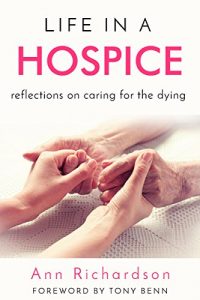
You work hard, carefully and totally out of the limelight. You produce a book that has some importance, as it is about the wonderful care that can be provided to people at the end of their lives. You think it will bring hope to ordinary people, worrying from time to time about how it will be for them or their family. Not to mention some support to those who do this work, as their labours and their difficulties are not often given much recognition.
The book gets the occasional review, but is not well marketed by the publishers, and falls into that vast collection of books that sell one or two copies a year. This is not good enough. So, you get the rights to the book back and re-launch it on Amazon. It begins to sell a lot more copies.
And then you get a review that understands what it is all about:
This is a gem of a book for anyone interested in palliative care and hospice work. There are many myths and preconceptions around what goes on inside the walls, many of them increase people’s anxiety and fear about contemplating death and dying.
Ann Richardson has taken a unique approach to this subject by sharing insights from a wide range of people who work in a palliative care setting. Their reflections are incredibly honest and insightful, as contributors share the joys and sorrows of their role. Anyone reading this collection of insights will gain a true picture of how those working in the setting bring a range of practical skills to the task in hand, but also bring themselves whole-heartedly, and often at personal cost.
There is a starkness in some of these reflections that represents the challenge of working with death every day, but if prospective patients were to read this, they would gain an assurance that those offering care are people of compassion and a deep sense of caring.
Hospices are unusual places in that they represent ‘thin places’ between life and death. People often have a view of what a building will be like that is at a great contrast from the reality. Ann’s presentation of such a variety of hospice life snap shots is a valuable resource for potential patients and their families, to give confidence in the support they will receive.
Staff and volunteers have reflected on their work with congruence and it is a tribute to Ann that they were prepared to speak about their emotions so freely. It is a unique collection of honest reflections and I commend Ann for bringing such a collection together to inform the public of the different roles with in the life of a hospice, but also to allow such a range of people a voice to share deeply held personal insights into these places which offer specialist palliative care.
Ann gives a picture of a hospice which could be representative of the many similar places that exist in this country, providing other hospices with a great resource to share with patients and staff alike.
by Karen Murphy, chaplain at Weston Hospicecare and President of Association of Hospice and Palliative Care Chaplains (AHPCC).Karen Murphy and Bob Whorton are the authors of Chaplaincy in Hospice and Palliative Care, Jessica Kingsley Publishers, 2017
Yes, hospice care is important – I hope many more people are able to get this message.
To buy Life in a Hospice, available in paperback or as an e-book, go to https://amzn.to/2FbSta9 or https://www.books2read.com/u/bpWk0z




